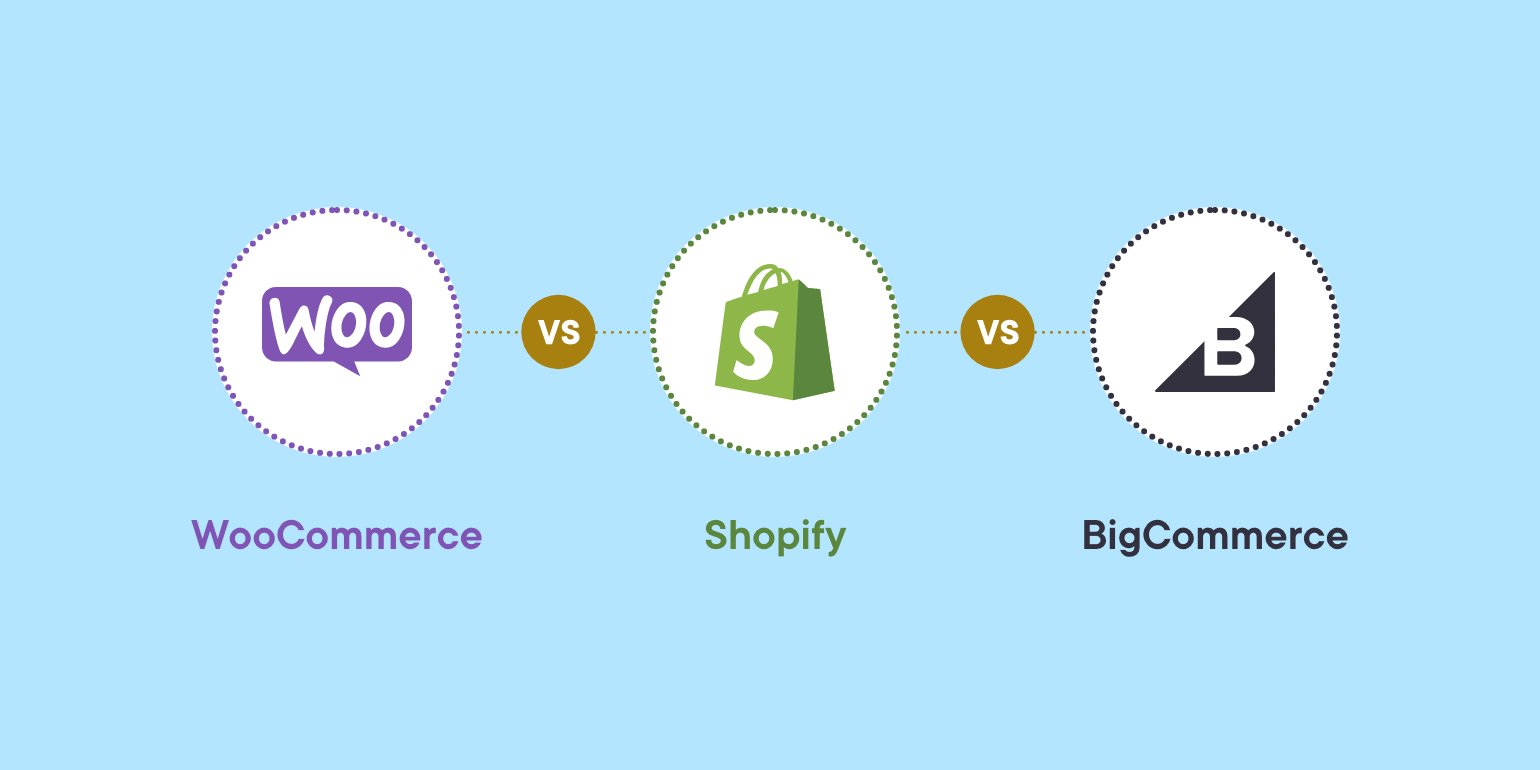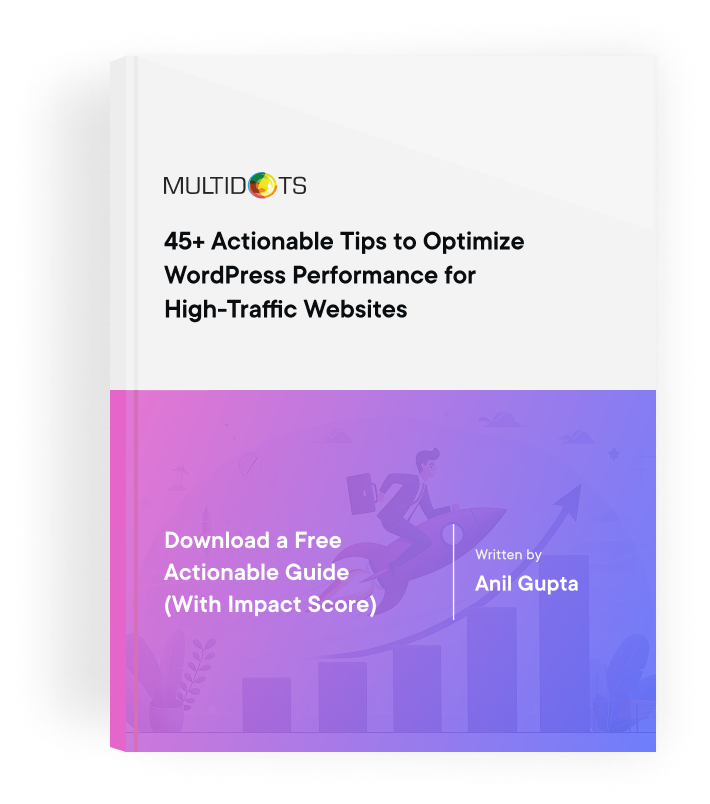WooCommerce vs. Shopify vs. BigCommerce
Evaluate WooCommerce, Shopify, and BigCommerce to determine the best eCommerce platform for your business needs

Table of Contents
Overwhelmed by the numerous options for your existing or upcoming eCommerce store? You’re not alone. With the popularity of online stores growing over the last decade, it has become essential for businesses to sell their products and/or services online. Customers expect to buy many goods and services online and to address that need, it is essential that most every business give consideration to an online store, with an ecommerce website as the core product these platforms help you create and manage.
Many entrepreneurs hire web developers to get their online business started. However, the DIY approach can prove to be much more economical for new business ventures. If you are up for the challenge of doing it yourself, how do you choose the right ecommerce solutions for your services? This article breaks down three of the most popular and cost-effective eCommerce platforms used to build and manage an ecommerce site—WooCommerce, Shopify, and BigCommerce—in order to help you decide where to take your business. We will explore the security, flexibility, cost, and features of WooCommerce, Shopify, and BigCommerce.
Introduction to eCommerce Platforms
Ecommerce platforms are the backbone of modern online stores, providing businesses with the essential tools to sell products and services over the internet. These software solutions empower ecommerce businesses to design their websites, manage inventory, process payments, and handle shipping logistics—all from a single dashboard. Leading ecommerce platforms like WooCommerce, Shopify, and BigCommerce each bring their own strengths to the table, catering to different business needs and technical skill levels. When selecting the right ecommerce platform, it’s important to consider factors such as ease of use, customization capabilities, scalability for future growth, and the ability to integrate with third-party services.
Robust inventory management is also a key feature, ensuring that ecommerce businesses can efficiently track stock levels and fulfill customer orders. With the right ecommerce platform, businesses can streamline operations and create a seamless shopping experience for their customers
What is WooCommerce?
WooCommerce is a free plugin, woocommerce plugin, and ecommerce plugin that integrates with WordPress, the world’s most popular CMS for building a website. WooCommerce requires a wordpress website and is a wordpress plugin that adds ecommerce functionality to your site. To use WooCommerce, users must install WordPress and then add the WooCommerce plugin.
WooCommerce powers 22% of all online stores, making it the most popular eCommerce platform in the world. It transforms a wordpress website into a full-featured woocommerce store and woocommerce platform. Users can further extend WooCommerce’s functionality by installing additional plugins from the wordpress plugin directory. Ripleys, Weber, and the Spectator Shop are all loyal users of WooCommerce.
What is Shopify?
Shopify is an all-in-one package, known as the Shopify platform, where you can create and publish your own store completely through Shopify. With Shopify, you can build a shopify store or multiple shopify stores, taking advantage of its ease of setup, customization options, and built-in features. It is cloud-based, eliminating the need for pesky software upgrades. Approximately 18% of all online stores use Shopify. Budweiser, the New York Times Shop, and Penguin Books all use Shopify.
Shopify Starter is an affordable entry-level plan designed for social media selling, ideal for small or new businesses with basic needs.
Shopify Payments is Shopify's integrated payment gateway, simplifying online payments and reducing transaction fees.
What is BigCommerce?
BigCommerce is also an all-in-one solution, known as the BigCommerce platform, where customers can build a BigCommerce store without purchasing hosting or themes from third-party companies. BigCommerce tends to target larger brands and organizations and represents just 3% of all online stores. Toyota, Martha Stewart, and Gibson are all major corporations that use BigCommerce.
The BigCommerce dashboard serves as the central hub for managing your store, providing easy access to analytics, support resources, and store settings.
BigCommerce offers a wide range of built in features, allowing users to set up and manage their online store efficiently without relying heavily on external apps or plugins.
Security
Because eCommerce stores handle not only listing products and goods for sale but also the financial element and the delivery information of transactions, high-level security is crucial to running a successful store.
An SSL certificate, also known as Secure Sockets Layer certificate, is responsible for protecting your website from hackers accessing the personal information of your customers. It ensures that the following things happen:
- Secure processing of personal information like credit cards
- Boosts your SEO as Google takes notes of sites with an SSL certificate
- Gives your customers the assurance that they are on a safe site
WooCommerce – because WooCommerce works with WordPress, it does not come with built-in security. Security is handled by WordPress itself and by the hosting provider. Likewise, an SSL certificate must be sourced separately. However, most hosting providers will provide you a free SSL certificate and WordPress itself is quite secure.
Shopify – because Shopify is a hosted eCommerce platform, the security is taken care of by Shopify. Shopify has a built-in SSL.
BigCommerce – like Shopify, BigCommerce is a hosted eCommerce platform, which means security is completely covered and an SSL certificate is provided. BigCommerce does have additional flexibility with its SSL certificates. Specialized SSL certificates can be built or transferred from third-party websites if the business needs something more customized.
Shopify and BigCommerce take the security concern out of your hands. WooCommerce can also be every bit as secure as those two but may take a little more tweaking.
Flexibility
Your eCommerce store needs to look good and suit your brand’s aesthetics. Determining which of these titans has the flexibility to meet your needs can be critical to your website’s success.
WooCommerce – this is an exceptionally flexible platform because of its open-source nature. Developers can add custom-built plugins to the store and because WooCommerce is self-hosted, all of your store’s files would be located on your own server and you can modify any features as you’d like. Moreover, WooCommerce has no limits on the number of product variations you have. If you have a coding background or are open to working with a developer then this is the best option to make your website shine. You can also use your own theme for complete creative control over your store’s design.
Shopify – this platform is hosted, which means Shopify manages your software for you. There is flexibility here but you’re limited to making changes within Shopify’s parameters. On the product variation side, Shopify puts a cap on 100 variants per product and 3 total options per product. Shopify also allows you to use your own domain or own domain name, which helps with branding and gives your store a professional appearance.
BigCommerce – As a hosted platform, BigCommerce’s flexibility is similar to Shopify’s, except they don’t cap product variations.
In terms of overall flexibility, WooCommerce gives the most creative control to the business operator. While Shopify and BigCommerce offer customizations that may fit your needs today, it is possible that in the future you will be restricted from what you can and cannot do on those two platforms.
Cost and Transaction Fees
Breaking down the most economical eCommerce platform can be challenging as Shopify and BigCommerce have set price plans. Meanwhile, WooCommerce is a free plug-in with add-ons that need to be purchased for it.
BigCommerce stands out by offering zero transaction fees on all its plans, which can be a significant cost saver for high-volume stores. It's important to note that 'transaction fee' refers specifically to the percentage or fixed amount charged per sale by the platform, which is separate from payment processor fees or other costs.
In summary, the differences in pricing structures become clearer when you compare Shopify to other platforms. A detailed shopify comparison shows that while Shopify charges transaction fees unless you use Shopify Payments, BigCommerce does not, and WooCommerce's costs depend on the extensions you need.
WooCommerce:
- Free plugin to add to your WordPress site
- SSL security - free with Let’s Encrypt, up to $199/year for certain certificates
- Web Hosting - $5/month or more depending on traffic. Some WooCommerce sites spend thousands of dollars each month on hosting.
Shopify:
- Free 14-day trial, an opportunity to test before committing
- Post-trial period, there are three options, all of which feature the online store, unlimited products, a range of staff accounts, 24/7 support, and sales channels
- The price breakdown:
- Basic Shopify – "All the basics for starting a new business"
- $29 per month
- Shopify - "Everything you need for a growing business"
- $79 per month
- Advance Shopify – "Advanced features for scaling your business"
- $299 per month
- Basic Shopify – "All the basics for starting a new business"
- Depending on your transaction quantity and revenue numbers, Shopify can charge thousands each month for high traffic/high transaction sites.
BigCommerce:
- A free 15-day trial before you buy
- Like Shopify, BigCommerce has three core price plans. All plans provide unlimited bandwidth and zero transaction fees.
- Standard – Sell online with your own beautiful online store
- $29.95 per month
- Does not include abandoned cart recovery features, a vital tool for businesses looking to scale
- Plus – Grow your online business with marketing tools proven to increase conversion
- $79.95 per month
- Pro – Scale your growing business with a comprehensive set of features
- $249.95 per month
- Like Shopify, high-transaction or high-revenue stores can incur much more expensive costs as growth increases.
- Standard – Sell online with your own beautiful online store
The most economical eCommerce platform here is WooCommerce. Both Shopify and BigCommerce are expensive and rigid in their pricing structure. With WooCommerce, you are able to build your own pricing plan with what you chose to add to your store.
Features
Brand promotion is the key to healthy growth for any business. Entrepreneurs must have an arsenal of marketing tools, robust ecommerce features, and integrated ecommerce tools to draw people to their site, as well as a user friendly interface and strong ecommerce functionality to keep them there.
SEO, or Search Engine Optimization, is how you get your website on a higher rank when it’s searched on Google or any other search engine. It is a critical aspect of selling online. All three eCommerce companies provide SEO tools that:
- Edit meta titles
- Update URLs
- Add image alt texts
Social Media is also critical for keeping you in touch with your audience and is a powerful way to promote new products, sales, and events. These platforms enable selling across multiple channels, including integration with social media platforms, to help expand your online sales reach. Some of the top features of each platform are as follows:
WooCommerce – Key Features:
- No holds bar optimization. You can manage every visual aspect
- Wide variety of WooCommerce themes available, with options for customization, responsiveness, and easy switching to suit your store's needs
- Built-in blogging
- Ability to embed products
- WooCommerce supports self hosting plugins, allowing for advanced customization and greater control over your store's functionality
- You can add sharing buttons, social media marketing apps, and link your posts
- User reviews and ratings (add product rating to page)
Shopify – Key Features:
- Discount codes
- Over 100 payment options
- Abandoned cart recovery
- Website and blog
- Modern and user-friendly administration
BigCommerce – Key Features:
- Integration with several marketing services, including Mailchimp
- Discount coupons and gift vouchers
- Product review functionality (not typically available on other platforms)
- User-friendly admin page
- Drag and drop builder
- Google Analytics integration for tracking and analyzing store performance
All three platforms are solid and offer wonderful features to power up your eCommerce store/business. After looking at their security parameters, flexibility, pricing, and platform features, how does one choose the best one for their needs?
BigCommerce would suit a larger business that sells to scale. If you are selling a handful of products, there are cheaper alternatives for your store. BigCommerce users would benefit from a bit of tech knowledge to be able to use it to its full ability. And while BigCommerce does allow users to customize some aspects of their online stores, it is not as flexible as other options.
Shopify is the most user-friendly choice and very easy to get started on. If you’re selling simple products, Shopify is a good option. Because Shopify only shows three product attributes, like size, weight, or color, it is best to use this for uncomplicated products. If your products have more specifications or your store requires more customization, you may find Shopify too limiting.
WooCommerce is hands down the best option for WordPress users who want to host their own site. This is more suitable for those with coding skills and who want full creative brand control of how their store looks. It is the king of customization. And if you don’t have coding skills? A massive (and easy to find) community of developers, designers, and web professionals is at the ready to bring your eCommerce dream to life.
To learn more about WooCommerce and how the experts at Multidots can customize and optimize your store contact us today. Our engineers can help to meet your organization’s needs while handling thousands of SKUs, including quick server response and faster page loading time.
References
Contact us today to craft your perfect WooCommerce solution.
contact us
